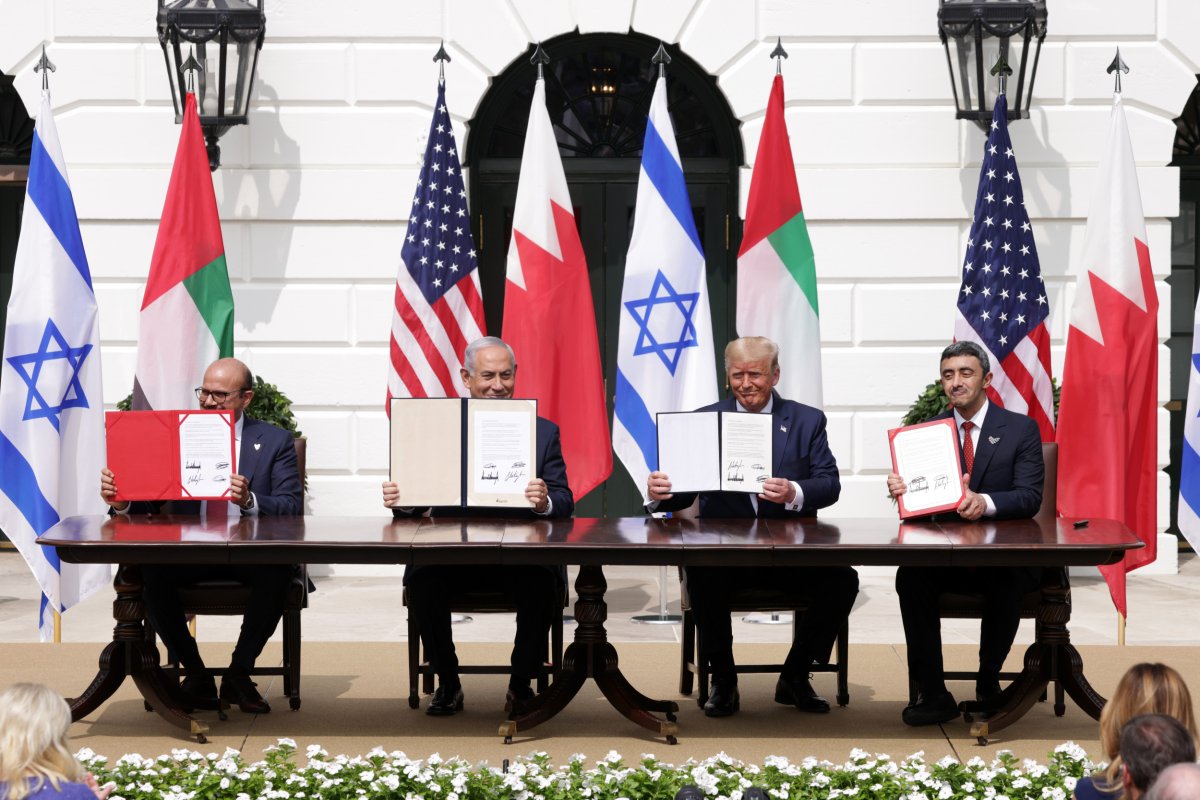Matthew Tostevin
When Bahrain's lower house of parliament announced that the kingdom's ambassador had been recalled from Israel early this month amid the fighting in Gaza, Bahraini authorities swiftly denied it.
As signatories of the groundbreaking Abraham Accords to establish ties with Israel under former U.S. President Donald Trump, Bahrain and the United Arab Emirates (UAE) are facing a diplomatic test during the Israeli assault on Gaza that followed the unprecedented cross-border attack by Hamas on October 7. But despite the rising Palestinian death toll and anger in the Arab world and beyond, with hospitals in Gaza the latest battlegrounds, the accords have yet to fray.
While the signatories support a ceasefire in Gaza and a peace deal with the Palestinians, they share common cause with Israel in challenging the militant Islam represented by Hamas and its Iranian backers, seek regional security alliances beyond their traditional reliance on the United States and are now bound to Israel through increasing economic ties.
"What the UAE and Bahrain have shown now is that they are very committed to the relationship," said Elham Fakhro, Research Fellow at the Institute of Arab and Islamic Studies at Exeter University, who is currently writing a book about the accords. "This relationship has already withstood a lot. This is just the next challenge," she told Newsweek.
The Abraham Accords, brokered by Trump's White House and initiated in 2020, were a series of historic normalization agreements between Israel and Arab nations that reshaped the political landscape of the Middle East. Previously the stance of many Arab countries had been that ties with Israel could only follow once it reached agreement with the Palestinians on establishing a state.
The accords were the signature foreign policy achievement of the Trump administration and include various bilateral pacts that cover areas such as trade, security, technology and tourism. After the initial agreements with Bahrain and the UAE, both Sudan and Morocco agreed on normalizing relations with Israel.

From left, Bahraini Foreign Affairs Minister Abdullatif bin Rashid Al Zayani, Israeli Prime Minister Benjamin Netanyahu, then U.S. President Donald Trump, and UAE Foreign Affairs Minister Abdullah bin Zayed bin Sultan Al Nahyan at the signing ceremony of the Abraham Accords at the White House on September 15, 2020, in Washington, DC. The accords are surviving despite the fighting in Gaza.
But critics saw the accords as potentially sidelining the Palestinians after decades of more-off-than-on negotiations that had failed to deliver a Palestinian state.
Former U.S. Ambassador to Israel David Friedman, a Trump appointee who was much criticized by the Palestinians and played a big role in encouraging normalization with other Arab states, said he believed through his contacts with those states that they would be only too happy to see Israel fighting Hamas, an offshoot of the Muslim Brotherhood.
"You would think that with Israel at war with an Arab party that would put a lot of pressure on the Abraham accords and in a pure kind of public relations sense there was some of that," he told Newsweek. "But I think the eradication of Hamas, which I do believe will happen, is a benefit to Israel and all the moderate nations."
Hamas, which seeks to destroy Israel and replace it with an Islamic state, launched an unprecedented raid from Gaza on October 7 in which at least 1,200 Israelis were killed. Since then, at least 11,200 Palestinians have been killed in Gaza in Israel's subsequent military operation, according to Palestinian officials cited by the Associated Press.
Ceasefire Calls
Last week, UAE President Sheikh Mohamed bin Zayed Al Nahyan reiterated calls for a ceasefire in Gaza and urged de-escalation to "secure a just, lasting, and comprehensive peace in the region." But a senior Emirati official had also told an online briefing organized by pro-Israel groups in the United States and Europe that "The Accords are our future," according to the European Jewish Press.
When asked about the position of the UAE on the accords, the official communication department said in a statement to Newsweek that "the most immediate priority for the UAE is to end the violence in the Gaza Strip" and stressed the importance of negotiations on a two-state solution, but without commenting directly on the accords.
In knocking down the report that the Bahraini ambassador had been recalled and trade links cut, the government said "the approach of the Kingdom of Bahrain to enhance security and stability and consolidate peace in the region", while underlining that this also included finding a "just solution to the Palestinian issue". It did not immediately respond to Newsweek's emailed request for comment.
Morocco has seen mass protests against Israel over the war in Gaza and its foreign ministry has condemned "Israeli acts of escalation" but it has not mentioned any threat to the normalization of ties. Nor did the head of Sudan's ruling Sovereign Council, even as he demanded a halt to "Israeli aggression."
"It's tricky what's happening because the Palestinian issue no longer takes center stage for the Arab governments, but it is center stage for the populations, who are out on the streets protesting," said Fakhro.

Smoke rises during an Israeli military bombardment of the northern Gaza Strip on November 15, 2023, amid the ongoing battles between Israel and the Palestinian group Hamas. Despite the fighting in Gaza, accords between Israel and Arab states have not frayed.
Itay Milner, spokesperson and consul for media affairs at the Consulate General of Israel in New York, told Newsweek the fundamental reasons for the accords had not changed and that their importance had if anything been intensified by the "malignant destabilization" of Iran in the region.
"We are confident that the Abraham Accords will emerge from this crisis stronger than ever before," Milner said.
Underpinning the Abraham Accords is a significant growth in trade. According to the Abraham Accords Peace Institute, which works to promote them, trade with Accords countries amounted to $3.37 billion in 2022. Flight links and overflight rights are among economic ties that make them increasingly hard to untangle.
"The Abraham Accords truly laid an economic and security foundation, the likes of which we had not seen since Camp David; a template we used when creating the Abraham Accords," said Joel Starr, former deputy assistant secretary of state for regional security in the State Department's Bureau of Political-Military Affairs, referring to the 1978 Camp David agreement between Egypt and Israel.
"I pray that the Accords will be as longstanding as Camp David, which also saw it tested by the many violent conflicts since involving non-state actors," Starr, now a senior adviser at the U.S. Institute of Peace think tank, told Newsweek.
While the Arab countries that had already normalized ties with Israel have not pulled back from the Abraham Accords, the war could make it harder to move ahead with other countries seen as potential candidates for the future—the most important of which is Saudi Arabia.
At a summit in Saudi Arabia at the weekend, Crown Prince Mohammed bin Salman, the kingdom's de facto leader, said: "We categorically reject this brutal war that our brothers and sisters are being subjected to in Palestine." The summit was also the occasion of the first trip by an Iranian leader since Riyadh and Iran reestablished relations in March.
However, Israelis are optimistic that Saudi Arabia will resume discussions on normalization after the war.
No comments:
Post a Comment